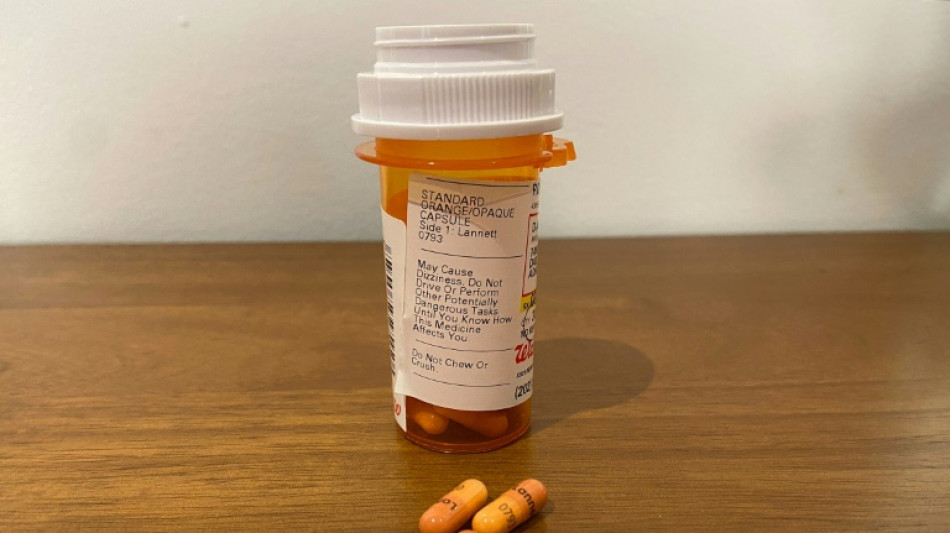
-
 US Navy veterans battle PTSD with psychedelics
US Navy veterans battle PTSD with psychedelics
-
'Unheard of': Dodgers in awe of iron man Yamamoto

-
 UK police probe mass train stabbing that wounded 10
UK police probe mass train stabbing that wounded 10
-
'It's hard' - Jays manager Schneider rues missed chances in World Series defeat

-
 Women's cricket set for new champion as India, South Africa clash
Women's cricket set for new champion as India, South Africa clash
-
Messi scores but Miami lose as Nashville level MLS Cup playoff series

-
 Dodgers clinch back-to-back World Series as Blue Jays downed in thriller
Dodgers clinch back-to-back World Series as Blue Jays downed in thriller
-
Vietnam flood death toll rises to 35: disaster agency

-
 History-making Japan golf twins push each other to greater heights
History-making Japan golf twins push each other to greater heights
-
Death becomes a growing business in ageing, lonely South Korea

-
 India's cloud seeding trials 'costly spectacle'
India's cloud seeding trials 'costly spectacle'
-
Chiba wins women's title, Malinin leads at Skate Canada

-
 Siakam sparks injury-hit Pacers to season's first NBA win
Siakam sparks injury-hit Pacers to season's first NBA win
-
Denmark's fabled restaurant noma sells products to amateur cooks

-
 UK train stabbing wounds 10, two suspects arrested
UK train stabbing wounds 10, two suspects arrested
-
Nashville top Messi's Miami 2-1 to level MLS Cup playoff series

-
 Fergie, her daughters and the corgis hit by Andrew crisis
Fergie, her daughters and the corgis hit by Andrew crisis
-
'I can't eat': Millions risk losing food aid during US shutdown

-
 High price of gold inspires new rush in California
High price of gold inspires new rush in California
-
'Swing for the fences': Carney promises bold budget as US threat grows

-
 UK police arrest two after 'multiple people' stabbed on train
UK police arrest two after 'multiple people' stabbed on train
-
NBA Hawks lose guard Young for four weeks with knee sprain

-
 50 dead as Caribbean digs out from Hurricane Melissa
50 dead as Caribbean digs out from Hurricane Melissa
-
Forever Young gives Japan first Breeders' Cup Classic triumph

-
 Mbappe's Real Madrid extend Liga lead, Villarreal move second
Mbappe's Real Madrid extend Liga lead, Villarreal move second
-
Salah savours 'great feeling' after 250th Liverpool goal

-
 Ethical Diamond surges to upset win in $5 million Breeders' Cup Turf
Ethical Diamond surges to upset win in $5 million Breeders' Cup Turf
-
Kinghorn kicks Toulouse to Top 14 summit

-
 Mbappe extends Real Madrid's Liga lead in Valencia rout
Mbappe extends Real Madrid's Liga lead in Valencia rout
-
All Blacks sink 14-man Ireland 26-13 in Chicago Test

-
 World champ Malinin takes lead at Skate Canada
World champ Malinin takes lead at Skate Canada
-
Liverpool snap losing streak as Salah hits 250 goals in Villa win

-
 Salah's 250th Liverpool goal sinks Villa as Arsenal cruise at Burnley
Salah's 250th Liverpool goal sinks Villa as Arsenal cruise at Burnley
-
Morant suspended by Grizzlies after rebuking coaching staff

-
 Spalletti begins Juve tenure with win at Cremonese but Napoli held
Spalletti begins Juve tenure with win at Cremonese but Napoli held
-
Frank refuses to condemn Van de Ven, Spence for snub in Spurs defeat

-
 France superstar Dupont extends Toulouse deal
France superstar Dupont extends Toulouse deal
-
Egypt officially opens grand museum near pyramids

-
 French fraud watchdog reports Shein for 'childlike' sex dolls
French fraud watchdog reports Shein for 'childlike' sex dolls
-
Scotland thrash USA before All Blacks' clash

-
 Five things to know about the Grand Egyptian Museum
Five things to know about the Grand Egyptian Museum
-
Bayern rest stars but ease past Leverkusen before PSG clash

-
 Dead quiet: Paris Catacombs close for renovations
Dead quiet: Paris Catacombs close for renovations
-
Families separated, children killed as survivors flee Sudan's 'apocalyptic' El-Fasher

-
 Napoli held by Como as Spalletti begins Juve adventure
Napoli held by Como as Spalletti begins Juve adventure
-
Southampton boss Still vows to fight on as pressure mounts

-
 Borthwick hails 'ball of energy' Pollock as England down Australia
Borthwick hails 'ball of energy' Pollock as England down Australia
-
Egypt opens grand museum in lavish, pharaonic ceremony

-
 Joao Pedro strikes at last as Chelsea edge past Spurs
Joao Pedro strikes at last as Chelsea edge past Spurs
-
Ohtani to open for Dodgers in World Series deciding game seven


High doses of Adderall linked with heightened risk of psychosis and mania
Adderall is an effective treatment for attention deficit hyperactivity disorder (ADHD), but a sharp rise in US prescriptions over the past two decades has sparked concerns among researchers about rare but serious side effects.
In a striking new study published Thursday, a team led by psychiatrist Lauren Moran of Mass General Brigham in Boston found that individuals taking high doses of the stimulant face more than a fivefold increased risk of developing psychosis or mania.
Key factors include the lack of upper dosing guidelines and the notable increase in young adults using the medicine since the Covid-19 pandemic, driven in large part by the rise of telemedicine providers.
Moran told AFP her interest grew from her time at a hospital inpatient unit treating college students in the greater Boston area.
"We were just seeing a lot of people coming in without much of a psychiatric history, developing the first episode of psychosis or mania in the context of using prescription stimulants," she said.
When the Food and Drug Administration became aware of such cases in the 2000s, it added a warning to the drug's label -- but relatively little research had been done to quantify the rates of side effects or how they related to the dosage level.
For their investigation, Moran and colleagues reviewed the electronic health records of people aged 16 to 35 admitted at Mass General Brigham hospitals between 2005 and 2019. That is the typical onset ages for psychosis, or losing touch with reality.
The researchers identified 1,374 individuals experiencing their first episode of psychosis or mania -- a disruptive state characterized by high energy, erratic behavior -- and compared them to 2,748 control patients who were hospitalized for other psychiatric conditions.
By analyzing Adderall use during the previous month and adjusting for other variables like substance use, they were able to specifically determine the impact of stimulants.
They found those who had taken Adderall were 2.68 times more likely to have been hospitalized with psychosis or mania compared to those who were not -- and this increased to 5.28 times more likely at higher doses of 40 milligrams and above.
A separate analysis found no increased risk with Ritalin, another stimulant prescribed for ADHD. Moran suggested this could be due to key differences in how the two drugs work.
- Telemedicine companies -
Both medications raise dopamine levels, a chemical messenger involved in the brain's reward system, motivation, and learning. However, while Adderall, an amphetamine, increases dopamine release, Ritalin works by blocking its reabsorption.
For Moran, a critical takeaway was the need for clear upper dose limits on labels. The current label recommends treating patients with 20 milligrams, but in practice, doctors vary widely in their prescriptions.
This variability partly stems from severe impairment in ADHD symptoms that require higher doses, but Moran has occasionally observed "carelessness in dose prescribing," while at other times, patients may "shop" for a doctor willing to prescribe what they want.
"People, including clinicians, might think they can eliminate all ADHD symptoms, but that's not a realistic expectation," she added.
Telemedicine companies, in particular, have come under scrutiny for allegedly overprescribing Adderall, contributing to shortages for those who genuinely need the medication.
The Drug Enforcement Administration, which had proposed revoking telehealth prescriptions for Adderall, extended them through the end of 2024 in response to significant public feedback.
D.Schlegel--VB




